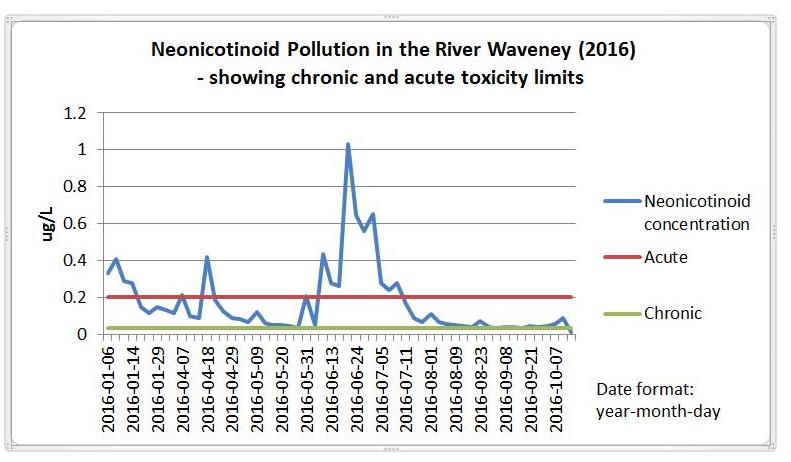Rivers in England are contaminated with powerful insecticides, new testing has revealed, increasing concerns over the impact of the toxic chemicals on fish and birds. Eight rivers in England are heavily contaminated with neonicotinoid pesticides. Two of the rivers, the Waveney on the border between Norfolk and Suffolk, and the Tame in the West Midlands, had an “acute level” of pollution, according to tests conducted by the Environment Agency last year. The most polluted river tested was the river Waveney on the Norfolk/Suffolk Border, where the acute harm level was exceeded for a whole month in the summer of 2016. Other rivers which exceeded pollution limits included the Great Ouse in Bedfordshire, the Ancholme in Lincolnshire and the Wensum in Norfolk.
Neonicotinoids have been in use since the early 1990s and now contaminate landscapes around the world. But very little monitoring of their concentration in soils or water is done, a failing recently condemned by a UK government chief scientific adviser. Like flying insects, aquatic insects are vulnerable to neonicotinoids and provide the main source of food for many fish and birds. Recent research in the Netherlands has shown chronic neonicotinoid pollution in water led to sharp drops in insect numbers and was linked to heavy falls in bird numbers.
Primarily polluted with Imidacloprid
River Ouse (Bedfordshire) – Mixed arable/grassland, with waste water treatment plant.
Somerhill Stream – Urban, with waste water treatment plant.
Wyke Beck – Urban, with waste water treatment plant.
Primarily polluted with Clothianidin
River Ancholme – Arable with small waste water treatment plants.
River Tame – Urban, with waste water treatment plants.
Polluted with both Clothianidin and Imidacloprid
Sincil Dyke – Arable with urban, with waste water treatment plants (River Witham).
Polluted with both Clothianidin and Thiamethoxam
River Waveney – Arable, catchment sensitive farming, with waste water treatment plants.
River Wensum – Arable, catchment sensitive farming, with waste water treatment
Sources:
The Times, 13 Dec 2017
https://www.thetimes.co.uk/edition/news/eight-english-rivers-are-pollut…
The Guardian, 13 Dec 2017
https://www.theguardian.com/environment/2017/dec/13/english-rivers-poll…
Buglife, 12 Dec 2017
https://www.buglife.org.uk/news-&-events/news/heavy-neonicotinoid-insec…

- Login om te reageren
